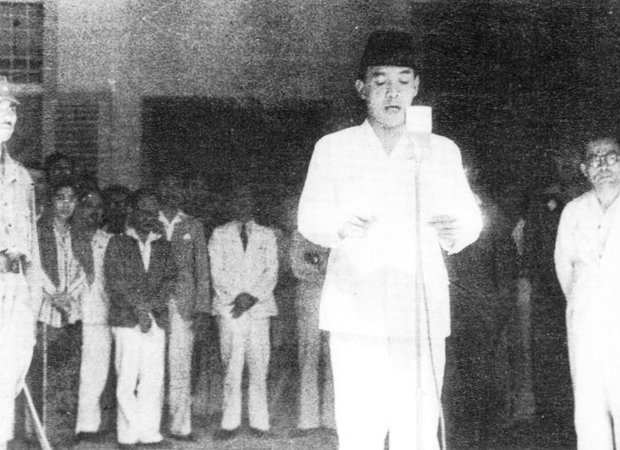PERHIMPOENAN INDONESIA
Full English tekst below
Vanaf het begin van de twintigste eeuw raken Indonesiërs er steeds meer van doordrongen dat ze worden gediscrimineerd en uitgebuit door de Nederlanders die hun macht in de kolonie steeds verder uitbreiden. Tal van factoren zijn van invloed op het ontluikende politieke bewustzijn, voornamelijk de opkomst van de Indonesische pers en het verbeterde opleidingsniveau van een Indonesische elite. Via het westers onderwijs komen Indonesiërs in aanraking met moderne politieke stromingen zoals het liberalisme en het nationalisme.
In 1912 wordt de Indische Partij opgericht, de eerste nationalistische partij met als doel een onafhankelijk Indië. De oprichters van de partij worden bijna direct verbannen naar Nederland, waar ze samenwerking zoeken met de Indische Vereeniging, een organisatie voor Indonesische studenten in Nederland. Mede onder invloed van de Indische Partij wordt de studentenvereniging steeds radicaler in hun nationalisme. In 1922 wijzigen ze hun naam van Indische- naar Indonesische Vereeniging en vanaf 1925 gebruiken ze de Maleise vertaling van hun naam: Perhimpoenan Indonesia (PI). Het tijdschrift waarin ze hun politieke ideeën verspreiden noemen ze: Indonesia Merdeka (Indonesië Vrij).
Veel oud-PI leden keren terug naar Indië, waar ze prominente posities in de Indonesische onafhankelijkheidsbeweging bekleden. In 1927 richten Indonesische nationalisten in Bandung de Perserikatan Nasional Indonesia (Indonesische Nationale Unie, PNI) op. Een van de oprichters is Sukarno: de man die in 1945 de eerste president van de republiek Indonesië zou worden.
Op 17 augustus 1945 roept president Sukarno de republiek Indonesië uit. Rechts op de foto vicepresident Mohammad Hatta, voormalig leider van de PI.

President Sukarno roept de republiek Indonesië uit
National Library of Indonesia
1945
Luister hier naar een audio fragment.
INDONESIAN PATRIOTIC CRIES ON THE J.B. VAN HEUTSZ MONUMENT, BATAVIA, OCTOBER 1945
Photograph, Collection Wereldmuseum
‘Indonesia never again the “life-blood” of any nation’. After the Japanese occupation, Indonesia became an independent country on 18 August 1945. However, the Netherlands refused to accept it.
When Dutch troops returned to Indonesia to restore colonial rule, they were confronted with such texts by Indonesian nationalism everywhere in Batavia. Not without reason, this text was written on the monument for J.B. van Heutsz, ‘pacificator’ of Aceh. To the Dutch, he was a hero; to the Indonesians, he was a colonial suppressor. The texts were in English, as they also addressed the international community. Only after a savage war and under significant international pressure did Queen Juliana sign the transfer of sovereignty on 27 December 1949.
Perhimpoenan Indonesia
At the beginning of the twentieth century, Indonesians increasingly realised that they were being discriminated against and exploited by the Dutch, who were increasing their power in the colony. Numerous factors contributed to the burgeoning awareness, particularly the emergence of Indonesian press media and the increased level of education of the Indonesian elite. Through Western education, Indonesians learned of modern political streams such as liberalism and nationalism.
In 1912, the Indische Partij, or Indies Party, was founded. It was the first nationalist party aiming at an independent Indonesia. The initiators of the party were almost directly banned to the Netherlands, where they sought cooperation with the Indische Vereeniging or Indonesian Association, an organisation of Indonesian students in the Netherlands. Partly influenced by the Indies Party, this student association became increasingly radical in its nationalism. In 1922, it changed its name to avoid the allusion to the former colonial name for Indonesia. As from 1925, it used the Malay translation of its name: Perhimpoenan Indonesia (PI). They called the magazine in which they spread their political ideas Indonesia Merdeka (Free Indonesia).
Many former PI members returned to the Dutch East Indies, where they assumed prominent positions in the Indonesian independence movement. In 1927, Indonesian nationalists founded the Perserikatan Nasional Indonesia (Indonesian National Party, PNI) in Bandung. One of its founders was Sukarno, the man who would become the first president of the Republic of Indonesia in 1945.
On 17 August 1945, President Sukarno pronounced the Republic of Indonesia. To the right is Vice President Mohammad Hatta, former leader of the PI.

President Sukarno roept de republiek Indonesië uit
National Library of Indonesia
1945
Click here to listen to a soundbite.